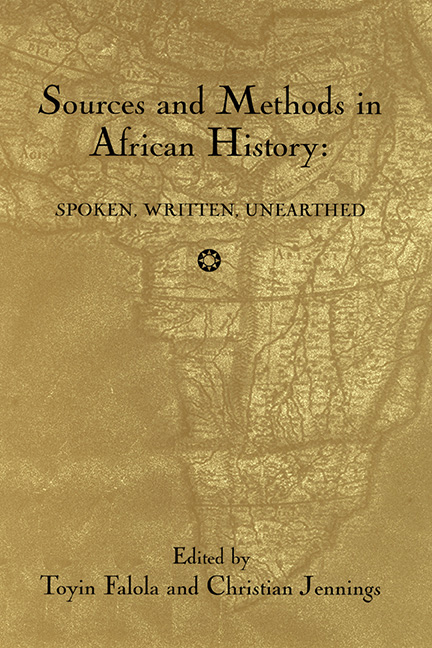Book contents
- Frontmatter
- Dedication
- Contents
- Acknowledgments
- Introduction
- Part I Archaeological Sources
- Part II Africa and the Atlantic World
- Part III Documentary Sources
- 10 Section Introduction: New Approaches to Documentary Sources
- 11 They Called Themselves Iloikop: Rethinking Pastoralist History in Nineteenth-Century East Africa
- 12 Interpreting Cases, Disentangling Disputes: Court Cases as a Source for Understanding Patron-Client Relationships in Early Colonial Lagos
- 13 Capricious Tyrants and Persecuted Subjects: Reading between the Lines of Missionary Records in Precolonial Northern Namibia
- Part IV Oral Tradition
- Part V Innovative Sources and Methods
- Contributors
- Index
10 - Section Introduction: New Approaches to Documentary Sources
from Part III - Documentary Sources
Published online by Cambridge University Press: 25 October 2017
- Frontmatter
- Dedication
- Contents
- Acknowledgments
- Introduction
- Part I Archaeological Sources
- Part II Africa and the Atlantic World
- Part III Documentary Sources
- 10 Section Introduction: New Approaches to Documentary Sources
- 11 They Called Themselves Iloikop: Rethinking Pastoralist History in Nineteenth-Century East Africa
- 12 Interpreting Cases, Disentangling Disputes: Court Cases as a Source for Understanding Patron-Client Relationships in Early Colonial Lagos
- 13 Capricious Tyrants and Persecuted Subjects: Reading between the Lines of Missionary Records in Precolonial Northern Namibia
- Part IV Oral Tradition
- Part V Innovative Sources and Methods
- Contributors
- Index
Summary
Documentary sources are the sine qua non for historians, but few Africanists discuss them critically. This is partly because such sources are meager and we have been more intent on developing alternative sources and partly because they are largely seen as biased European accounts. This is ironic, given that we suffer from an overall lack of written sources, and it contrasts markedly with similar situations in classical, medieval, and East Asian history, where historians have developed sophisticated techniques to extract every possible detail from the few documents they have. But smarting from attacks that, without documentary evidence, Africa had no history, we looked elsewhere for sources to reconstruct that history while often dismissing what documentary sources there were as fatally flawed. There is only one journal that considers methodological issues, History in Africa, and it is only recently that critical editions of the Periplus and early European travel accounts have revealed the degree to which they were often based on hearsay, plagiarized from earlier accounts, and recycled through successive editions and translations. We thus need to take the written word both more seriously and more critically.
There are a number of different aspects in the critical examination of documentary sources. We must assess what types of document and perspectives have survived and which have not. We have to question a document's provenance, who produced it, when, and why. We need to ask how authentic a version is and how it may have changed through successive versions and editions since the original. We must carefully read what a document says, how it says it, and why. And we have to explore the historical context of the document, how that context informs the document, and what it reveals of the context.
Christian Jennings provides a classic example of close reading of accounts by early missionaries and travelers to question earlier interpretations of Maasai history. In doing so, he carefully establishes the provenance of the accounts by identifying who wrote them, their interests, and their linguistic abilities and experience. He establishes the identity and authenticity of their sources. And finally, he reads carefully for content, establishing the meaning of significant terms and their changes over time. In short, Jennings shows us just how much information can be gleaned from early European accounts, material that is otherwise unavailable.
- Type
- Chapter
- Information
- Sources and Methods in African HistorySpoken Written Unearthed, pp. 169 - 172Publisher: Boydell & BrewerPrint publication year: 2003

